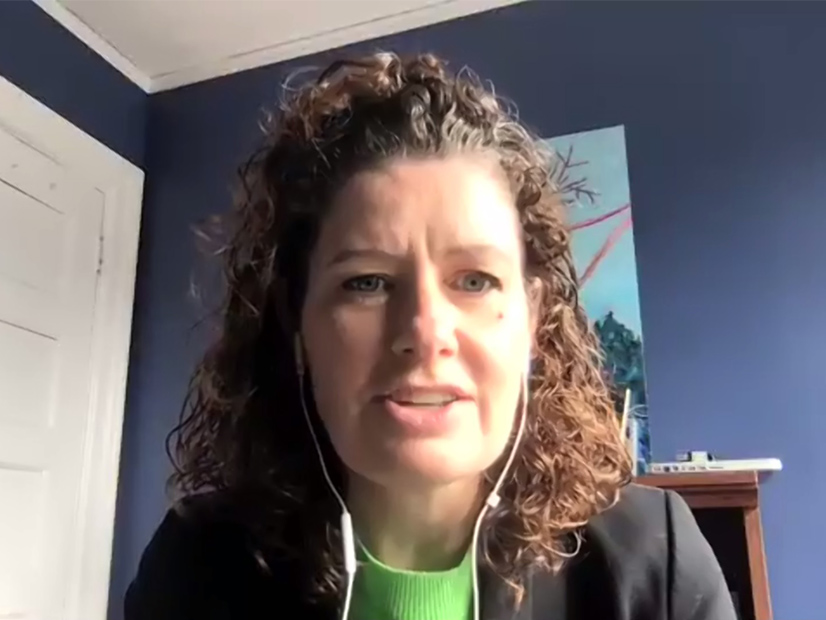A bill pending in the Connecticut legislature will set the stage for the state to take advantage of what Commissioner Katie Dykes expects will be a “tidal wave” of federal infrastructure funding.
“Those federal dollars require some level of state or local matching funds, and … we need to have some entity that’s going to perform the operation and maintenance responsibilities on that infrastructure on a going forward basis,” said Dykes, who heads the Department of Energy and Environmental Protection (DEEP).
Dykes briefed business leaders on DEEP’s priorities during an Environmental Business Council Connecticut leadership webinar on Earth Day.
The Act Concerning Climate Change Adaptation (HB 6441) advances recommendations made in January by the Governor’s Council on Climate Change for financing climate adaptation and resilience infrastructure.
“It creates those funding streams and creates those institutions at the state and local level that can help operate and maintain climate resilient infrastructure going forward,” she said. “It’s especially timely and will help Connecticut be … poised to really tap into federal dollars as much as possible.”
The bill would expand the scope of the Connecticut Green Bank by creating an Environmental Infrastructure Fund that can receive federal funds for infrastructure investment. It also increases the Green Bank’s bond authorization from $100 million to $250 million, according to the bill’s fiscal note. The Green Bank would use funding and its bonding authority to invest in and stimulate private investment in opportunities ranging from climate adaptation to carbon offsets. As of November 2020, the note said, the Green Bank had outstanding special capital reserve fund (SCRF)-backed debt of $27.4 million.
“The SCRF provides a higher level of repayment security, which results in a lower rate of interest on the bond issuance than the relevant market rate,” the note said. “In the event that the SCRF is drawn down in part or completely, a draw on the general fund is authorized and the SCRF is fully restored.”
Municipalities and regions would be able to raise revenue for local infrastructure projects through expanded stormwater authorities provided by the bill. Dykes said more frequent storms and sea level rise will stress the state’s stormwater infrastructure, making both “green and gray” infrastructure investment critical in the near term. In addition, the bill would broaden the scope of existing flood and erosion control boards to include flood prevention and climate resilience.
“We are second only to Florida in the percentage of our insured property values that have vulnerabilities and exposure to climate impacts, especially sea-level rise,” Dykes said. “It’s really critical that we have these tools in place to protect our communities, to protect businesses and our infrastructure as these impacts of climate change accelerate.”
The bill is part of a package of legislative priorities released by Gov. Ned Lamont in February. It was reported out of the Legislative Commissioners’ Office on April 15 and placed on the House calendar. The House reconvenes on April 26.
TCI-P Bill Pending
A bill that would require DEEP to implement the Transportation and Climate Initiative Program (TCI-P) was reported out of the Legislative Commissioners’ Office on April 20 and placed on the Senate calendar.
The Act Reducing Transportation-related Carbon Emissions (SB 884) also is part of Lamont’s priority package of bills. TCI-P would cap emissions from gasoline and diesel fuels and create auctions for emissions allowances.
“We can’t move forward with the program unless we get authorization from the General Assembly,” Dykes said. “It’s become a major priority for the governor.”
Under the draft TCI-P model rule released by the Transportation and Climate Initiative in March, initial emissions reporting would begin next year, and the first auctions and compliance requirements would start in 2023. (See TCI Releases Draft Rule for Cap-and-Invest Program.)
If Connecticut implements the program, it could generate $88.6 million for the state in 2023 at an assumed price of $6.60 per metric ton of emissions, according to the bill’s fiscal note. After 2024, the proceeds could reach $115 million annually.
Dykes said that funding can provide for rebates for businesses to switch to EVs, and the state can invest in EV charging infrastructure.
TCI-P will “help companies to meet their sustainability goals with respect to transportation,” she said. “We have great flexibility in how those dollars can be put to work.”
The Senate reconvenes on April 27.



